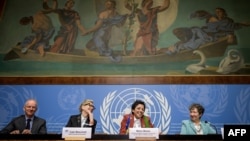The U.N. refugee agency warns the battle to stamp out global statelessness is being threatened by growing anti-refugee and migrant sentiment, as well as rising nationalism.
More than 220,000 people have acquired citizenship since the U.N. refugee agency launched a 10-year global campaign in 2014 to end statelessness. Now at the mid-point of the campaign, activists welcome the progress that has been made, but note so much more remains to be done.
They report at least four million people still live without legal documents to prove who they are. Australian actor and UNHCR Goodwill Ambassador Cate Blanchett said statelessness has a devastating impact on their lives. She said they experience marginalization and exclusion from cradle to grave.
"And those of us who have a nationality and have a paper identity, it is often very hard for us to imagine, because we take this for granted, just like breathing. It is hard for us to imagine the degree of invisibility and despair often that stateless people experience,” she said.
Blanchett said stateless people do not belong anywhere. They are denied an education and medical care. They cannot open a bank account or travel. They cannot get married or get a death certificate.
“It is total invisibility. And the desperate and horrific gift that they often give to their children is that their children, too, become stateless. So, it is a generational problem,” she said.
The UNHCR says solutions are urgently needed for millions without citizenship or at risk of becoming stateless around the world. The scale of the problem is particularly overwhelming for the more than one million Rohingya refugees in Bangladesh and millions more still living in Myanmar.
A recent government decree has put minority populations in India’s Assam state at risk of becoming stateless if they cannot prove their citizenship. This, though they have lived in the region for generations.
On a better note, the #IBelong campaign has brought global awareness to the issue and wracked up some successes. For example, Madagascar and Sierra Leone have reformed their nationality laws. They now allow mothers, as well as fathers, to confer citizenship on their children.
However, 25 countries continue to make it impossible for mothers to confer this right on their children. This remains one of the leading causes of statelessness globally.







